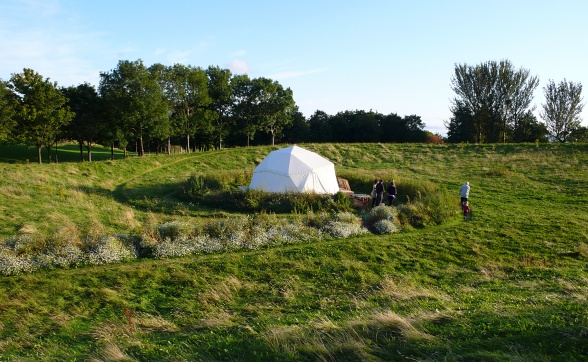Fritz Haeg
Fritz Haeg Everton Park H.Q. and Foraging Spiral, 2012
Fritz Haeg re-activates the present and re-imagines the future of Liverpool’s Everton Park in partnership with local residents and collaborators.
Haeg occupied a sheltered bowl-shaped site at the top of Everton Park for the summer leading up to Liverpool Biennial 2012. Working with the community, the first phase of the project, commenced in late May, and was conceived as an expedition into the park, featuring a ‘base camp’ headquarters for a series of experiments to publicly present the range of activities and features that local people would like to see in their park. Treating the hollow space as a microcosm of the entire park, the series of modestly scaled elements might of included anything from semi-permanent plantings and paths, working up to a week of programmed events and workshops housed in a temporary domed structure during the opening week of the Biennial.
Architect, gardener and educator Fritz Haeg's (b.1969, Minesota, USA) recent projects include Edible Estates (2005-ongoing), an agricultural project replacing suburban lawns with productive, consumable landscapes. Haeg’s edible gardens are developed in partnership with local residents, responding to the unique nature of each site and challenging preconceptions of land use and development patterns. In 2008 Haeg debuted Animal Estates at the Whitney Biennial. The project proposed the reintroduction of native animals into cities through designs for urban dwellings.
Fritz Haeg at Liverpool Biennial 2012
Everton Park H.Q. and Foraging Spiral, 2012
Commissioned by Liverpool Biennial 2012
Exhibited at Everton Park
Supported by
Liverpool Vision
Liverpool City Council
Liverpool Primary Care Trust
Liverpool Biennial
55 New Bird Street
Liverpool L1 0BW
- T +44 (0)151 709 7444
- info@biennial.com
Liverpool Biennial is funded by
Founding Supporter
James Moores
